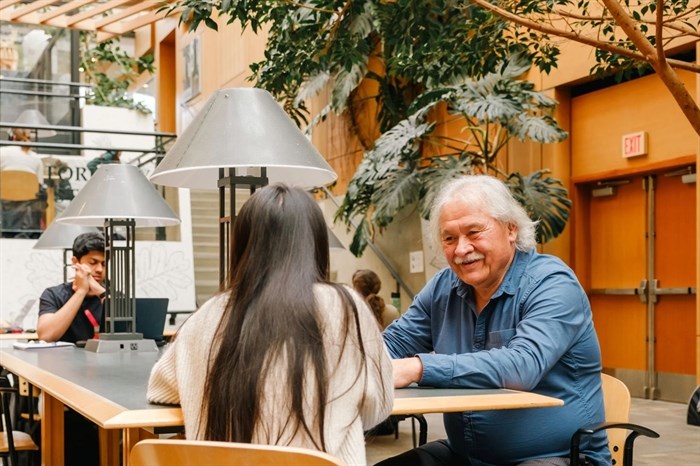
Garry Merkel, director of UBC’s Centre for Indigenous Land Stewardship, speaks with a student from the program’s first cohort.
Image Credit: SUBMITTED
May 10, 2025 - 4:00 PM
Canada’s first Indigenous land stewardship degree puts Indigenous law, governance and connection to land at the heart of environmental education.
Hayley Toderian, 29, waited two years to enrol.
Now, she’s part of the inaugural class in a groundbreaking undergraduate program at the University of British Columbia, the first of its kind.
The four-year degree was created in response to growing recognition of the need for Indigenous-led approaches to land management and environmental challenges, land reclamation and environmental policy.
For Toderian, who is a member of Sts'ailes First Nation (also known as Chehalis First Nation in BC), the program offered something she had been searching for a long time. She began post-secondary studies in 2019 at Langara College in general studies, but found herself drawn to courses focused on Indigenous topics.
In 2021, she transferred to the Native Education College to enrol in a one-year certificate program in Indigenous land stewardship — at the time, the only one of its kind in the country. That’s where she first heard UBC was developing a full undergraduate degree in the field. The program hadn’t launched, but she decided to wait.
“Not everybody gets told that their dream school program will be happening in two years,” she said.
The program, housed within UBC Forestry, goes beyond ecological practices to include the political, legal and ethical frameworks of Indigenous land stewardship.
“A lot of peoples’ minds automatically go to using fire to shape nature, or how you hunt or fish or gather,” said Garry Merkel, a Tahltan forester and the director of the Centre for Indigenous Land Stewardship at UBC Forestry. “But what we’re talking about here is: how do you build practical land stewardship systems that can function effectively in today’s world?”
Merkel said students explore Indigenous systems of land tenure, resource allocation and dispute resolution — frameworks developed and maintained by communities over centuries. Their goal is to equip graduates with the tools to implement stewardship strategies in collaboration with governments, industry and, most importantly, Indigenous communities.
With the ongoing implementation of the DRIPA in British Columbia and answering the Calls to Action from the Truth and Reconciliation Commission’s report, Indigenous stewardship is at the forefront of many nations’ agendas, said Carrie Anne Vanderhoop, who is Haida of Old Massett, director of the Haida Gwaii Institute and a sessional lecturer in UBC’s Indigenous Land Stewardship program.
As many First Nations sign co-management agreements with provincial and federal governments, the program aims to prepare students to take on these responsibilities.
“It is important that we have these younger people coming up and taking leadership, preparing themselves for leadership roles and being at these tables and making decisions about what happens in their territories," said Vanderhoop.
The program is grounded in an earth-centred worldview that challenges dominant Western paradigms. That includes understanding how oral Indigenous legal traditions, deeply rooted in specific territories, can be applied in contemporary contexts such as co-management agreements or negotiations with industry.
“Our assumption is that most Indigenous communities believe you are one equal part of land, and everything else has just as much right to be here as you do,” said Merkel. “We are not in control. We are not dominant. Nature is not there to serve us.”
He said this philosophy extends to how decisions are made — through consensus, respect for diverse perspectives and recognition that human well-being is inseparable from the health of the ecosystem. The program was co-developed with Elders, knowledge keepers and community members and is taught by Indigenous lecturers.
“We’re trying to build a movement with the program,” Merkel said.
Their vision is to be part of a globally recognized standard for environmental management by 2050 that integrates Indigenous knowledge and other sciences.
The program’s first cohort of 12 students began in September. UBC designed the program to be accessible — it is mostly remote, allowing students across the country to stay in their communities or territories while pursuing their degrees.
Financial support, including $8.5 million from the Mastercard Foundation, is available to Indigenous students. The funding helps cover tuition, relocation and work support, making it easier for First Nations, Métis and Inuit students to pursue the program without losing cultural and geographic ties.
Toderian, who grew up in Port Coquitlam without a connection to her band, said she felt a “strong sense of longing” for culture. Over the past decade, she’s been rebuilding that relationship, a journey that the program has helped deepen.
“This program changed my relationship with Canada,” she added. “It helped me understand not only my culture but also how I can help my community and the land that sustains us.”
— This article was originally published by Canada's National Observer
News from © iNFOnews, 2025